Furious Investors Protest Outside China's Insolvent Shadow Banking Giant After It Misses Payments, Warns "Liquidity Has Suddenly Dried Up"
Things are getting very ugly for both the so-called "China's Blackstone", and China in general.
Just days after we reported that the "secretive" shadow-banking giant, Zhongrong, also called "China's Blackstone" as it manages (or rather managed) 1 trillion in AUM, had missed payments on "multiple shadow banking (i.e. high-yield investment) products", stoking fresh worries about contagion amid China's deflationary pressures and, of course, a tottering real estate sector, which as a reminder is the largest asset class on earth...
... overnight Bloomberg reported that Zhongrong's troubles have accelerated and the asset manager not only missed payments on dozens of products - adding to delays on at least 10 others since late July - but "has no immediate plan to make clients whole, indicating troubles at the embattled Chinese shadow bank are deeper than previously known."
The troubles are so deep in fact, that Zhongrong - which is one of the largest players in China's $3 trillion shadow banking industry - appears to be effectively insolvent: "the company doesn’t have an immediate plan to cover the payments since its short-term liquidity has suddenly dried up", said Wang Qiang, board secretary of the firm partly owned by financial giant Zhongzhi Enterprise Group.
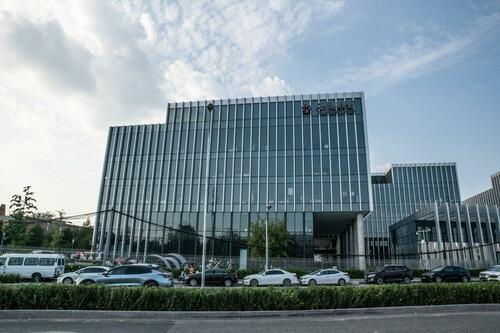
He added that the number of products with missed payments has risen and the company is facing a “tsunami” of questions from investors and their own wealth managers, according to the people familiar, who asked not to be identified because the meeting was private. Wang asked for patience as the firm seeks to recoup the value of its investments.
Unfortunately, investor patience has dried up and from a separate Bloomberg report we learn that furious Chinese investors protested outside the office of Zhongrong in "a rare show of public outrage after the firm skipped payments on dozens of investment products."
Videos of the incident showed about two dozen protesters at Zhongrong International Trust Co., demanding payment on high-yield products that were pitched as safe investments. In one of the clips posted on Wechat seen by Bloomberg News, a woman angrily asks: “Why doesn’t the company pay us back?” she says. “It has already matured. Your financial statements said there is a profit.”
The company isn't paying you back for one simple reason: it's broke.
The protesters in Beijing were met by about 10 police and security officers, while a company official tried to keep the peace. One woman is heard shouting: “Give us the money back, or we will die here.” Another says: “Why you don’t give us a clear explanation?”
A reporter who visited the Zhongrong office Wednesday afternoon didn’t see any protesters but there was an unusually heavy police presence around the building.
Officers were seen sitting in several police vans and cars parked inside and outside the office compound, and other police vehicles were placed on roads nearby. Officers were also watching the area from inside one of the several city buses that were parked at the main gate or nearby. Workers were erecting extra fencing around the building.
The protests - not to mention the admission of insolvency - indicates that troubles at the embattled Chinese shadow bank are deeper than previously known, and underscore how the fallout from the real estate slump is spreading to the financial sector. Many trust products sold by Zhongrong and others are backed by housing projects run by troubled developers such as China Evergrande Group, which of course, is also broke.
And since at least 30 products are now overdue and Zhongrong has also halted redemptions on some short-term instruments, the investor fury will only grow.
Zhongrong is among the biggest firms in the country’s $2.9 trillion trust industry, which pools savings from wealthy households and corporate clients to make loans and invest in real estate, stocks, bonds and commodities. The firm has 270 high-yield products totaling 39.5 billion yuan ($5.4 billion) due this year, according to data provider Use Trust. Chinese authorities have already set up a task force to study any possible contagion from the shadow banking group, which manages about $138 billion. The firm said it has no immediate plans to make clients whole.
According to Bloomberg, the trust sector’s exposure to real estate is about 2.2 trillion yuan, or 10% of total assets as of the end of 2022. Zhongrong is the ninth-biggest trust, with about 600 billion yuan in assets.
“The big danger is that a negative feedback loop kicks in, with property stress causing strains in the financial system, undermining credit expansion and depressing growth, which, in turn, exacerbates the slump in the property sector,” Bloomberg Economics said in a note.
"The good news is that regulatory vigilance means a rerun of the 2008 U.S. crisis is unlikely," Gavekal Dragonomics' Xiaoxi Zhang wrote on Wednesday, unless of course a rerun of the 2008 crisis is imminent, especially if China doesn't pursue helicopter money as a top PBOC banker has recommended.
"The bad news is that debt strains from property developers and local-government financing vehicles are spreading across China's economy."
“Given the recent net asset value markdowns and redemptions, we expect growth in trust products to slow, which could result in tighter property financing conditions, and affect banks’ earnings and balance sheets,” Goldman analyst Shuo Yang wrote in a note. Not that China can afford any tighter financial conditions or even more property turmoil...
And speaking of property turmoil, overnight China reported that new home prices fell in July for the first time this year, the latest in a string of downbeat data that underlines the urgency for bolder policy support. Prices fell 0.2% month-on-month on a nationwide basis and 0.1% year-on-year, according to the National Bureau of Statistics (NBS).
But the picture is far worse outside of the country's megacities like Shanghai and Beijing. Average new home prices in the 35 smallest cities surveyed by NBS fell for the 17th straight month in June on a year-on-year basis.
The worsening debt crisis at major developers including Country Garden, the country's biggest private developer, has scared away many home buyers, with property investment, home sales and new construction contracting for more than a year.
Country Garden promised "five-star living" to the masses in less popular, smaller cities but focusing on those areas has come back to haunt it. Its plight has raised fears that its debt problems will ripple through the stalling economy. Given the property market has traditionally accounted for about a quarter of China's economy, some analysts say the slump, combined with the shock from three years of strict COVID measures, has had an unprecedented impact on activity.
And speaking of Country Garden, which we also profiled last week, the distressed Chinese developer warned about “major uncertainties” in redemption of its bonds, as it said that trading in some of its local notes will remain suspended. The builder, whose cash crunch threatens even worse impact than defaulted peer China Evergrande Group given it has four times as many projects, made the comments in a filing with the Shanghai stock exchange.
As discussed previously, Country Garden, which was previously the nation’s biggest builder, is on the verge of default if it doesn’t make dollar bond interest payments missed earlier this month within a 30-day grace period. The crisis at the firm, helmed by one of China’s richest women, Yang Huiyan, has pushed its notes deeper into distress and weighed on China’s broader financial markets.
It had suspended trading of 11 onshore notes issued by the company and subsidiaries earlier this week. The builder has been soliciting feedback on a proposal to extend payment of a 3.9 billion yuan ($535 million) note due Sept. 2, people familiar with the matter said earlier this week.
In any case, most analysts expect further falls in home prices and sales over coming months, not to mention the country's GDP. Barclays and JPM are among a number of global banks to cut its forecasts for China's 2023 growth after weak data on Tuesday, citing a faster-than-expected deterioration in the housing market. Barclays lowered its growth forecast to 4.5% from 4.9%, JPM also sees China's GDP below the promise 5% minimum.
Some economists say many consumers and small businesses are already feeling economic pain as deep as during a recession, given youth unemployment at record rates above 21% and deflationary price pressures squeezing companies' profit margins (going forward Beijing has decided to simply not report youth unemployment at all). Meanwhile, new bank loans fell to a 14-year low in July.
The central bank's surprise interest rate cuts on the same day will not be enough to arrest the economy's downward spiral, several analysts said.
Highlighting the difficulties facing policymakers, China's property sector continues to struggle despite an extension of financial support for developers and incentives for first-time home buyers and upgraders.
Last month, China's top leaders in a Politburo meeting vowed to adjust property policies. The housing regulator has also urged efforts to prop up the sector such as lower home mortgage rates and down payment ratios for first-time homebuyers and easing mortgage curbs for people who want to upgrade their homes.
Some cities including Zhengzhou have already relaxed a handful of property curbs. Provincial capitals like Xian and Fuzhou are considering reductions in downpayment ratios for residents who buy second flats.
"We continue to expect more housing easing measures in coming months, including further reduction in down-payment ratios and more relaxation of home purchase restrictions in large cities, among others," economists at Goldman Sachs said in a note to clients.
However, most economists expect the property slump to drag on for some time.
"High-frequency data in early August does not suggest any meaningful improvement in the property market," said Wang Tao, Head of Asia Economics and Chief China Economist at UBS Investment Bank.
"Without additional major policy easing and/or fiscal support, property sales and investment may weaken further or stay at the bottom for longer than assumed in our baseline," said Wang.

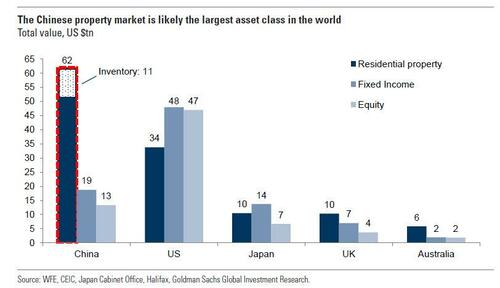
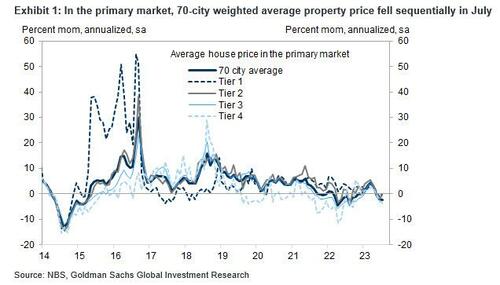
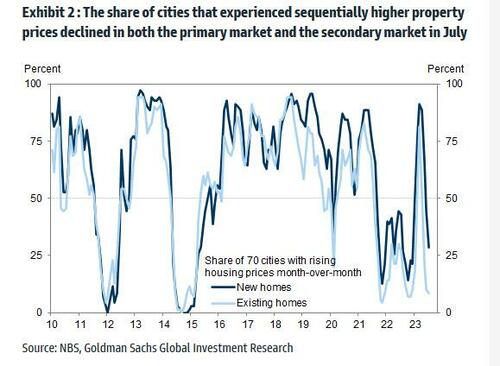
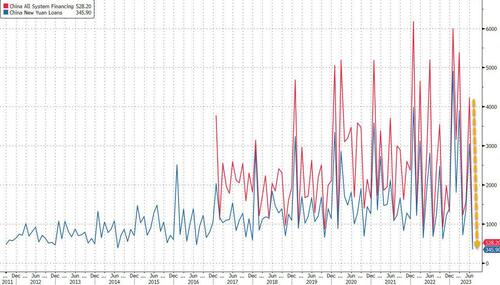
This comment has been removed by a blog administrator.
ReplyDelete